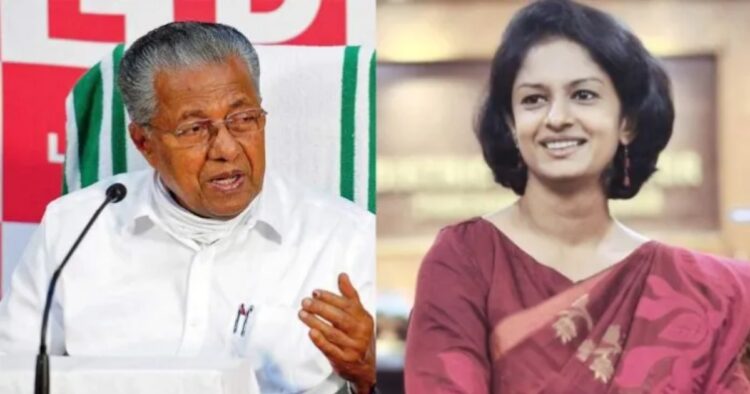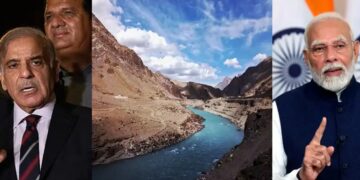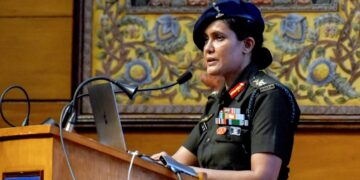Kerala’s Controversial Appointment Order
The Kerala government’s recent move to appoint IAS officer K Vasuki as the Secretary for “External Cooperation” has sparked a heated debate across the political landscape in India. This decision by the Left Democratic Front (LDF) government has been met with strong criticism from the Bharatiya Janata Party (BJP) and several constitutional experts, who argue that it violates the Indian Constitution and could pose a serious threat to national integrity.
On July 15, 2024, the Kerala government issued an order appointing IAS K Vasuki to handle “External Cooperation” matters. The state government clarified that Vasuki’s role would involve liaising with the Ministry of External Affairs (MEA) but would not equate to a formal position of ‘Foreign Secretary.’ This clarification, however, has done little to quell the controversy. Critics argue that this move blurs the lines of constitutional authority, as foreign affairs fall exclusively under the Union government’s jurisdiction.
The appointment of an IAS officer as 'Foreign Secretary' in Kerala by CM Pinarayi Vijayan is a blatant overreach and a violation of the Union list of our Constitution. The LDF government has no mandate in foreign affairs. This unconstitutional move sets a dangerous precedent. Is…
— K Surendran (@surendranbjp) July 20, 2024
The BJP has strongly condemned the appointment. K Surendran, the BJP State President, criticized the Kerala Chief Minister Pinarayi Vijayan, accusing him of a “blatant overreach” and breaching the Union List of the Indian Constitution. Surendran questioned whether Vijayan was attempting to establish Kerala as a separate entity, separate from the Indian Union. He also warned of potential repercussions, suggesting that this move might be linked to alleged corruption scandals involving the Kerala government.
Kerala govt’s move to appoint a secretary for foreign affairs blatantly challenges federal principles. Is this a misguided governance attempt or another step in CM @pinarayivijayan’s history of dubious foreign consulate ties? @PMOIndia @AmitShah @JPNadda @BJP4India @BJP4Keralam pic.twitter.com/rk2VnH1jvu
— V Muraleedharan / വി മുരളീധരൻ ( Modi Ka Parivar) (@VMBJP) July 20, 2024
Surendran highlighted ongoing investigations into the Kerala government, including accusations of gold smuggling through the UAE consulate and financial irregularities linked to the Kerala Infrastructure Investment Fund Board (KIIFB). He speculated that the new position might be a strategy to safeguard the financial interests of the Chief Minister in Gulf countries.
Former Minister of State in MEA, V Muraleedharan, echoed these concerns, suggesting that the appointment was a “tactical ploy” to support frequent foreign trips by Kerala officials. He urged the Kerala Governor to revoke what he termed an “unconstitutional” order that undermines federal principles. Muraleedharan’s criticism is rooted in a broader context of alleged dubious foreign relations and smuggling activities involving Kerala’s top officials.
In response to the backlash, the Kerala government has defended its decision. Chief Secretary Venu V clarified that the role of Secretary for “External Cooperation” was not a new creation but rather an existing position aimed at improving coordination with international delegates visiting the state. He assured that this role did not infringe on the Union government’s exclusive rights over foreign affairs.
The LDF government’s defense is that the appointment of Vasuki is not a violation of the Constitution but rather a move to enhance Kerala’s engagement with international partners. This stance aims to address practical coordination needs without overstepping constitutional boundaries.
Constitutional experts, however, argue otherwise. Former Foreign Secretary Harsh Vardhan Singhla has criticized the Kerala government’s justification, asserting that the appointment of an officer for ‘External Cooperation’ is essentially the same as appointing a ‘Foreign Secretary.’ He emphasized that the Union List, which includes foreign affairs, clearly delineates areas where only the central government can legislate and make appointments.
Singhla pointed out that foreign policy is a central government domain, and states must not engage in formulating or managing foreign policy independently. His concerns underscore the potential constitutional violation in the Kerala government’s approach.
The broader implications of this appointment are significant. Critics argue that allowing states to appoint officials for foreign affairs could undermine the federal structure enshrined in the Indian Constitution. Such actions might embolden other states to challenge central authority in various domains, leading to a potential breakdown in the coordinated governance system.
The fear is that this precedent could encourage states to create similar unconstitutional posts or engage in actions that disrupt national integrity. The possibility of regional governments setting up their own mechanisms for foreign dealings could lead to a fragmented approach to foreign policy, affecting national unity and coherence.
There is concern that this move could also have repercussions beyond India’s borders. The creation of a state-level “Foreign Secretary” role might lead to segmentation among Indian citizens abroad, fostering regional and linguistic divides. This could weaken the sense of national identity among the Indian diaspora and create complications in diplomatic relations.
The current controversy reflects broader tensions between central and state authorities, with some political leaders and commentators arguing that recent decisions by state governments challenge the federal framework of the Indian Constitution. Such actions could further polarize the political environment and impact the functioning of Indian democracy.
As the debate continues, the Kerala government’s decision will likely face further scrutiny and legal challenges. The Kerala Governor’s response and potential intervention could play a crucial role in determining the outcome of this controversy. The central government and legal experts will need to address these constitutional concerns to maintain the balance of power between the Union and state governments.
Kerala’s appointment of IAS K Vasuki as Secretary for “External Cooperation” has ignited a complex debate about constitutional authority and federalism in India. While the Kerala government views this as a practical move to enhance international coordination, critics argue that it threatens the constitutional balance and national unity. The resolution of this issue will be pivotal in shaping the future dynamics of Indian federalism and governance.
ALSO READ: “Indian Student from Kerala Feared Drowned in Latvia’s Jugla Canal”

















Comments